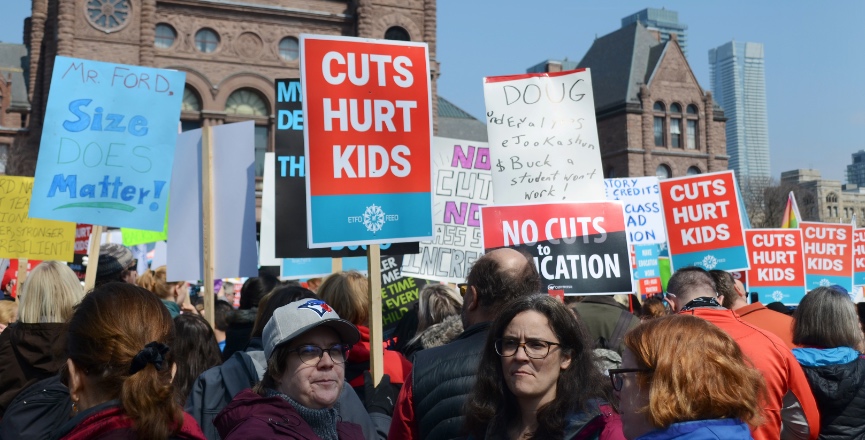Seventy-nine per cent of CUPE education workers have voted in favour of the agreement the union’s bargaining committee reached with the Ontario government last month.
The union announced the results of the ratification vote at a press conference at Queen’s Park on Monday morning.
The agreement retains $58 million in funding that the Ontario government had originally threatened to cut, while securing an additional $20 million. According to the Canadian Union of Public Employee (CUPE), 1,300 jobs have been saved as a result of this funding.
CUPE represents approximately 55,000 support staff in the province including special needs assistants, early childhood educators and custodians.
Other terms of the agreement include an annual one per cent wage increase for workers, plus the maintenance of the current sick leave package, which had come under fire from the school boards.
The union attributed the reversal of the funding cuts to the solidarity between education workers, parents and students in the midst of massive cuts by the Ford government.
“The message to the Ford government is clear,” said Rachel Huot, a parent at Carleton Village Junior and Senior school, who shared the stage with CUPE representatives.
“Families will not be pitted against teachers and education workers. We are united and together we can stop cuts and strengthen the public education system to build schools all kids deserve.”
Parents and students have participated in multiple actions over the last several months to oppose the government’s education cuts, including a massive walkout in April and a province-wide rally on October 10.
Other education unions are currently in the midst of bargaining, with the Elementary Teachers Federation of Ontario having voted 98 per cent in favour of strike action.
Lowest wages in the education sector: CUPE
Laura Walton, president of CUPE’s Ontario School Board Council of Unions (OSBCU), said that with the average union member earning $38,000, they were the lowest paid education workers in the province.
“When you have hydro going up 1.8 per cent and your wage only going up 1 per cent, it really highlights where there may be a problem,” she said, highlighting the below-inflation wage increases.
When asked whether the government was unwilling to budge on wages, Walton said the union was focused on the services required by students.
However, she referred to the “me too” clause in the agreement, which means that if other unions in the sector bargain higher wage increases, those would automatically apply to CUPE workers as well.
“Now we’re hoping that our colleagues and at other bargaining tables can take up the fight for wages,” Walton said.
Next steps
While this agreement deals with broader issues such as wages and funding, the 109 local CUPE bargaining units will now mediate with school boards on issues including scheduling, pay equity and contracting out.
The province and school boards had been using non-unionized workers to do the job of CUPE members, Walton said.
Walton also highlighted that the union wanted to maintain a dialogue with the government on effectively investing in education, noting that there were many pending issues including violence against workers, maintenance of school buildings and protection of the kindergarten program.
Fred Hahn, CUPE Ontario president, said the agreement was an important step but systemic issues still need to be addressed.
“We will continue to keep the spotlight on the damage that chronic underfunding has done to Ontario’s system of public education,” he said.
Zaid Noorsumar is rabble’s labour beat reporter for 2019, and is a journalist who has previously contributed to CBC, The Canadian Press, the Toronto Star and Rankandfile.ca. To contact Zaid with story leads, email zaid[at]rabble.ca.
Image: Mary Crandall/Flickr



